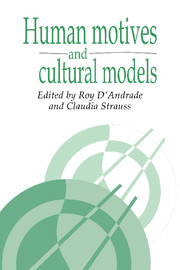Book contents
- Frontmatter
- Contents
- List of illustrations
- Preface
- List of contributors
- 1 Models and motives
- Part I Cultural models as motives
- Part II How do cultural models become motives?
- Part III Cultural models as motives reconsidered
- 8 Motivated models
- 9 What makes Tony run? Schemas as motives reconsidered
- 10 Afterword
- Index
9 - What makes Tony run? Schemas as motives reconsidered
Published online by Cambridge University Press: 05 June 2012
- Frontmatter
- Contents
- List of illustrations
- Preface
- List of contributors
- 1 Models and motives
- Part I Cultural models as motives
- Part II How do cultural models become motives?
- Part III Cultural models as motives reconsidered
- 8 Motivated models
- 9 What makes Tony run? Schemas as motives reconsidered
- 10 Afterword
- Index
Summary
It is obvious that people's wants are shaped, to a large extent, by their culture. There are probably few goals shared by! Kung hunter-gatherers, United States businesspeople, and Hindu renouncers. But how, exactly, does culture shape motivation?
Following some recent work by Roy D'Andrade (1984, 1990, this volume), I assume that insight into this problem can be provided by looking at the cognitive representation of cultural knowledge. Unlike D'Andrade, however, I argue that cognitive representations can differ in the kind of motivational force they provide. This paper focuses on five Rhode Island male blue-collar workers' talk about “getting ahead.” I also know about some significant choices they have made in their work lives. What I found is that their choices have been directed by three types of knowledge. These three types of knowledge differ not just in content, but also in form of cognitive representation, manner of verbal expression, and type of motivational effect.
Schemas and directive force
D'Andrade's central thesis is that culturally formed cognitive schemas not only determine our interpretation of the world but also direct our actions in it, often serving as goals. To appreciate this claim it is necessary to understand what a cognitive schema is.
Casson (1983) provides a helpful review of the cognitive science literature on schemas.
- Type
- Chapter
- Information
- Human Motives and Cultural Models , pp. 197 - 224Publisher: Cambridge University PressPrint publication year: 1992
- 55
- Cited by



